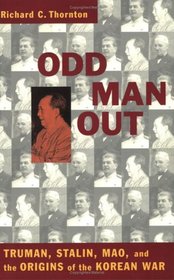Search -
Odd Man Out: Truman, Stalin, Mao and the Origins of Korean War
Odd Man Out Truman Stalin Mao and the Origins of Korean War
Author:
ODD MAN OUT challenges the accepted wisdom and offers a startling reinterpretation of the events that led to the Korean War. It is a novel assessment of the motives, strategies, successes, and failures of Soviet, Chinese, and American leaders as they strugled to maneuver their countries into positions of advantage. Professor Richard C. Thornton... more »
Author:
ODD MAN OUT challenges the accepted wisdom and offers a startling reinterpretation of the events that led to the Korean War. It is a novel assessment of the motives, strategies, successes, and failures of Soviet, Chinese, and American leaders as they strugled to maneuver their countries into positions of advantage. Professor Richard C. Thornton... more »
ISBN-13: 9781574883435
ISBN-10: 1574883437
Publication Date: 8/15/2001
Pages: 448
Rating: ?
ISBN-10: 1574883437
Publication Date: 8/15/2001
Pages: 448
Rating: ?
0 stars, based on 0 rating
Genres:
- History >> Military >> Korean War >> General




